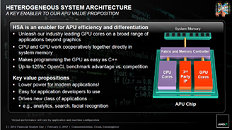Wednesday, October 24th 2012

AMD Could Place x86 and ARM Cores on the Same Silicon: Report
Following last week's 15% workforce cut that came with the company's Q3 2012 results, AMD plans to consolidate its workforce and eliminate "bureaucracy." According to a VR-Zone report, the company plans to announce its future strategy next week, on October 29. This strategy could ride heavily on recent moves the company made in the area of "heterogeneous computing," and a working alliance it built with the likes of ARM, MediaTek, Qualcomm, Samsung and TI, under the heterogeneous system alliance (HSA).
According to the report, AMD's future looks to be heading towards building highly versatile SoCs for devices in the post-PC era. It's not far-fetched to imagine, for example, that AMD could integrate ARM IP onto APUs with x86 cores, with the ARM cores based on recent micro-architectures such as Cortex-M5, performing specific kinds of tasks (such as data-encryption). Down the line, AMD could also integrate baseband components into the APU, beating Intel to the punch on similar efforts.
Source:
VR-Zone
According to the report, AMD's future looks to be heading towards building highly versatile SoCs for devices in the post-PC era. It's not far-fetched to imagine, for example, that AMD could integrate ARM IP onto APUs with x86 cores, with the ARM cores based on recent micro-architectures such as Cortex-M5, performing specific kinds of tasks (such as data-encryption). Down the line, AMD could also integrate baseband components into the APU, beating Intel to the punch on similar efforts.

30 Comments on AMD Could Place x86 and ARM Cores on the Same Silicon: Report
Hopefully PC industry don't die with all these stupid hand held devices (they are nice, but gaming on PC is better).
I'm not certain but I believe Super PI isn't really too heavily branching. However single threaded as it is you would tend to think that a CPU core running at 4Ghz would be faster at processing division than it is. Unless of course you have cache issues still.
Three types of processors on single chip GCN/ARM/x86 Faildozer. Why?
------------------------------------------------------------------
Which company makes the iPhone?
Is that a trick question?
Apple or Foxconn?:rolleyes:
Applied Micro which is leading the ARM server chargeThis could be a good medium. Having both bases covered while the industry decides which or if it moves or stays with one or the other.
Is that nothing but meaningless PR talk to programmers?
As for ARM, I'm really not seeing how this partnership is going to help AMD. AMD is so heavily invested in x86, does it really have the capability/time to become skilled at producing good ARM chips as well? If this is an attempt for AMD to compete with the upcoming Intel Clovertrail (Atom CPUs for tablets) and Haswell, I'm not sure what benefit there is in having heterogeneous instruction sets in a single CPU package.
post 2 and 6 in that thread have good explanations on why gpus suck at branching
wikipedia "branch prediction" should have some good info on the complexities and what cpu makers have been doing to improve it
Still sig worthy.
Intel bought out McAfee to develop its own solution.
Its just about adding extensions to it.